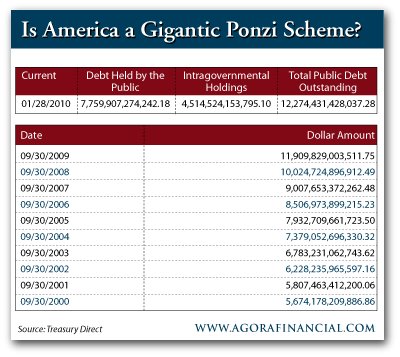Let's face it, the government-bond market in the West is a gigantic Ponzi scheme. Most governments in the “developed” world are drowning in debt, they are running mind-boggling budget deficits and printing money like there is no tomorrow. Furthermore, under the guise of quantitative easing, their central banks are buying their own newly issued debt!
It is our contention that similar to Mr Madoff's hedge fund, the sovereign debt markets in the West have now become gigantic scams. Only this time around, the players have changed and the sums involved are significantly larger.
Figure 1 highlights the incredible expansion in America's national debt. It is noteworthy that at the turn of the millennium, America's national debt was less than half of its current value. Put simply, American policymakers have taken on more debt over the past decade than they have over the last one hundred years!
Advertisement
What is more astonishing is the fact that America is funding a large portion of its newly issued debt by direct purchases from the Federal Reserve. In other words, as private-sector demand for US Treasuries wanes, Mr Bernanke is creating new money so that Mr Obama's government can bail out insolvent financial institutions. Strangely, the American establishment is quite content to pledge the economic fate of its future generations in order to protect the bondholders of dubious “too big to fail” corporations. Hmm, talk about change ...

Figure 1
Apart from the world's largest economy, various other nations in the “developed” world are also following such misguided policies. For instance, UK's national debt is exploding and is forecast to reach £1.1 trillion by 2011. At present, its national debt is worth £891 billion and this equates to £14,304 for every man, woman and child in the United Kingdom!
Elsewhere in Europe, the situation is equally dire in nations such as Ireland, Spain, Greece and Italy. Furthermore, various countries in Eastern Europe are on the verge of economic doom.
Advertisement
Given the precarious state of so many economies in the West, we are amazed that the respective government bond markets have not fallen apart at the seams. Perhaps, they are all heading down Japan's route, where national debt is now above 170 per cent of GDP, yet the yield on Japanese government debt is pathetic. But then again, perhaps they are not ...
In our view, in the not too distant future, the interest payments on the outstanding national debts in the overstretched “developed” nations will become so large that their central banks will need to create money just to keep the Ponzi schemes going. When that happens, the game will be up and we will probably experience a total breakdown of the fiat-money experiment. At this stage, we do not know when the day of reckoning will arrive but we do know that all Ponzi schemes ultimately collapse under their own weight and this one will be no different.
Given the shocking debt overhang in the West and the threat of surging inflation later this decade, we cannot understand why anybody would want to lend money to bankrupt governments!? In the worst case scenario, these naïve bondholders risk losing their entire capital and the best outcome involves a significant loss of purchasing power due to inflation. Accordingly, we are not investing in sovereign debt and we suggest that you refrain from lending money to dubious governments.
Discuss in our Forums
See what other readers are saying about this article!
Click here to read & post comments.
11 posts so far.